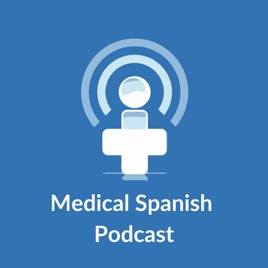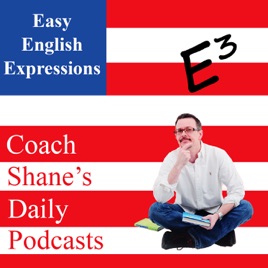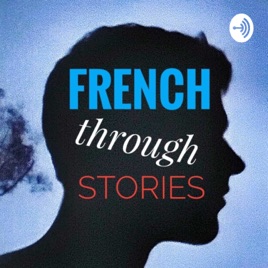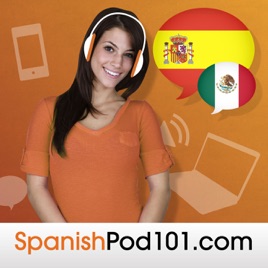
Advertise on podcast: Medical Spanish Podcast
Rating
4.5 from
Country
This podcast has
107 episodes
Language
Publisher
Explicit
No
Date created
2007/09/02
Average duration
15 min.
Release period
9 days
Description
These medical Spanish lessons are based on common clinical encounters written and recorded with my teachers from Latin America. We also interview real patients and providers from Latin America. In these interactive audio lessons, we cover basic to ADVANCED Spanish. In order to support this free podcast, I also offer member-only podcasts. In the interactive member lessons at docmolly.com, we take a deep dive into the Spanish you hear in the free lessons. We review the key vocabulary and grammar and interpret the key phrases between English and Spanish. This podcast is ideal for ANYONE (not just medical providers and interpreters) who wants to reach an advanced level through listening and speaking.
Social media
Check Medical Spanish Podcast social media presence
Podcast episodes
Check latest episodes from Medical Spanish Podcast podcast
Intro to Newborn Hearing Screening in Spanish
2024/02/24
Welcome to the first lesson in our series on Newborn Hearing Screening in Spanish!This series was requested by one of our listeners, Hyun from Maryland. Hyun is a newborn hearing technician who wants to learn phrases in Spanish for a newborn hearing screening. Even if you never plan to perform a newborn hearing screening, I promise you will learn helpful vocabulary and phrases for your clinical practice. In this series of 3 lessons,* We will learn how to ask about childhood hearing loss on either side of the family and complications during pregnancy.* As we describe the procedure, we will learn how to explain that the earbud will play chimes, that it is not painful, and that we can soothe the baby using the sucking reflex.* Finally, we will learn how to express a good result and explain that a bad result may be due to fluid in the ear and that we must allow some time for the ears to dry before retesting.This first lesson is free! To keep learning with us, become a member! Member? Download the PDF:
Introduction to Newborn Hearing Screening PDF
Reinforce what you learn using the Quizlet set for this lesson!Screening Test2:49La prueba de detección de problemas de audición en los recién nacidos Screening test for hearing problems in newbornsVocabularioLa prueba de detecciónScreening TestLos problemas de audiciónHearing problemsEl recién nacido, la recién nacidaNewbornLos recién nacidosNewbornsFamily History4:54¿Hay antecedentes de pérdida de audición infantil en la familia paterna o en la familia materna del bebé?Is there a history of childhood hearing loss on either side of the baby's family?Los antecedentesPrior cases, historyLa pérdida de audición infantilChildhood hearing lossLa familia paternaThe father's side of the family La familia maternaThe mother's side of the familyEn la familia paterna o en la familia materna del bebéOn either side of the baby's familyComplications during pregnancy7:36¿Usted sufrió alguna complicación durante el embarazo que hace que el médico se preocupe por la salud del bebé?Did you suffer any complications during your pregnancy that cause the doctor to be concerned about the baby's health?Alguna complicaciónAny complicationsEl embarazoPregnancyPreocuparseTo be concernedPreocuparse por la salud del bebéTo be concerned about the baby's health Alguna complicación que hace que el médico se procupeA complication that causes the doctor to be concernedWe use the subjunctive following verbs of influence, like HACER or CAUSAR. Learn more about verbs of influence. La salud del bebé, la salud de la bebé The baby's healthMore Lessons for Pediatrics* Child Development in Spanish* Viral Gastroenteritis in Spanish* Fever and a Rash – A Call to the Clinic in Spanish* ADHD in Spanish – Problemas en la escuela* ADHD in Spanish – Diagnóstico y tratamiento* Assess Asthma in Spanish like a Superstar!Gracias a Daniela Grave y a Luis Almeida por su ayuda con esta lección. Take classes with Daniela.a href="https://docmolly.
more
Lower Gastrointestinal Symptoms
2024/02/11
In this member lesson, we review symptoms of the lower GI tract in Spanish.
Luis Almeida nos acompaña desde Venezuela para ayudarnos con el español de esta lección.
Member at docmolly.com? Access full show notes, video, quiz, and downloadable PDF, and ask a question within our History and Exam Course.
** https://docmolly.com/course/bb11b-gi-ros-lesson/
Should I subscribe through docmolly.com or Apple Podcasts?
** https://docmolly.com/which-one-is-right-for-me-premium-medical-spanish-on-apple-podcasts-or-doc-molly/
TIMESTAMPS
00:35 Constipation & diarrhea
03:30 To have a BM
07:11 Characteristics of the stool
09:17 Digestion
10:39 Passing gas
12:59 Jaundice
Gracias por aprender español médico con nosotros.
more
Learn Gastrointestinal Symptoms in Spanish!
2024/02/02
Join Luis and me as we review gastrointestinal symptoms in Spanish. After the vocab review, we will practice some questions related to upper GI tract symptoms. In the next member lesson, we will complete our gastrointestinal review of systems in Spanish. Watch the video version of this lesson on YouTube.Member at docmolly.com? Access full show notes, the PDF, and the Quizlet set for this lesson. Master Medical Spanish With Us!Become a member and get access to ALL our Medical Spanish lessons!Sign up for our History and Exam Course.TimeStamps1:29 Symptoms8:47 Belly and GutsQuestions11:00 Nausea12:58 Heartburn and SwallowingClosing20:43 Support the podcast and access premium content. Related LessonsThe Sh¡t Show with Hector y Beto de "No Hay Tos"Internal AnatomyExternal AnatomyAbdominal Pain in SpanishVocabulary SymptomsStomach painEl dolor de estómago.Cramps (as in stomach cramps)Los retorcijonesLos retortijonesLos cólicosVomitingLos vómitosDiarrheaLa diarreaConstipationEl estreñimientoIndigestionLa indigestiónNauseaLas náuseasMorning sicknessLas náuseas de embarazo.Las náuseas matutinasHeartburnLas agrurasLa acidez (estomacal)Gastric refluxEl reflujo gástricoUlcerLa úlceraPeptic ulcerLa úlcera pépticaGastric ulcerLa úlcera gástricaDuodenal ulcerLa úlcera duodenalStool or bowel movementLas hecesEl excrementoEl/la popóDark red-colored poopEl popó de color rojo oscuroLa popó de color rojo oscuroBlack-colored stool (HECES)Las heces de color negro.Clay-colored excrement (EXCREMENTO)El excremento de color arcilla.Grey-colored stool (POPÓ)La popó de color grisHemorrhoidsLas hemorroidesLas almorranasBlood in the stool (HECES)La sangre en las hecesJaundiceLa ictericiaYellow skinLa piel amarillaDark urineLa orina oscuraBellyBellyLa barrigaLa panzaLa pancita (when speaking to children)PotbelliedBarrigónBarrigonaPanzónPanzonaPregnant belly, wombEl vientreAnd finally, you may also hear the following to refer to one’s bellyLa tripaIntestines, gutsLa(s) tripa(s)¡Gracias por aprender español médico con nosotros!
more
Contraindications to Thrombolytics in Spanish - Parte 2
2024/01/18
In this lesson, we complete our review of Spanish for discussing contraindications to thrombolytics.
Le doy las gracias a Luis Almeida por ayudarnos con el español de esta lección.
Member at docomolly.com? Access full show notes, video, the Quizlet set, and the PDF for this lesson in our Spanish for Emergencies course.
* https://docmolly.com/course/st13-contraindications-thrombolytics-2-lesson/
In this lesson, we will cover Spanish for the following contraindications to thrombolytic therapy:
00:52 Large stroke seen on CT
01:41 Certain intracranial lesions
04:47 Major surgery or head trauma
06:55 A non-compressible arterial puncture site
09:02 Recent brain or spine surgery
10:56 Seizure at symptom onset
14:32 Pregnancy
15:30 Recent heart attack
¡Gracias por escuchar!
more
Contraindications to Thrombolytics in Spanish – Parte 1
2024/01/14
In this lesson, we learn how to discuss contraindications to thrombolytics in Spanish. To assemble this lesson, I used a list of contraindications in the stroke chapter of my favorite medical education resource, MKSAP 19. Luis Almeida joins us from Venezuela to help us with the Spanish for this lesson.A video version of this lesson with subtitles is on YouTube. Check out our Shorts, where I share helpful tips.Member? Access full show notes, the Quizlet set, and the PDF for this lesson within our Spanish for Emergencies course! Not a member yet? Become a Premium Medical Spanish member. Access our collection of over 400 medical Spanish lessons, all our courses with quizzes, and our Premium Medical Spanish Podcast feed!LEVEL – ADVANCEDThere is a lot to cover. Therefore, we will do it in two lessons. In this free lesson, we will cover Spanish for the following contraindications to thrombolytic therapy:03:24 Greater than 4.5 hours since symptom onset05:05 Recent head trauma or stroke,07:03 Active internal bleeding,08:21 Recent gastrointestinal or genitourinary bleeding,11:25 Increased risk of bleeding or bleeding diathesis,14:15 Elevated BP (> 185/110) despite treatment17:04 Low blood sugar (50 mg/dL)18:26 Do you like our Medical Spanish lessons? Support the podcast by becoming a member! In the upcoming member lesson, we will complete our review of Spanish for discussing contraindications to thrombolytics. ¡Gracias por escuchar!
more
Explain Thrombolytics for Stroke in Spanish
2024/01/05
In this lesson, we learn how to explain thrombolytic therapy for stroke in Spanish. In future lessons, we will go over contraindications and risks.Luis Almeida joins us from Venezuela to help us with the Spanish for this lesson.A video version of this lesson with subtitles is on YouTube. Check out our Shorts, where I share helpful tips.Member? Access full show notes, the Quizlet set, and the PDF for this lesson within our Spanish for Emergencies course! Not a member yet? Become a Premium Medical Spanish member. Access our collection of over 400 medical Spanish lessons, all our courses with quizzes, and our Premium Medical Spanish Podcast feed!LEVEL - ADVANCEDWe have a drug called a thrombolytic.1:01Tenemos un tipo de medicamento que se llama trombolítico.thrombolyticslos trombolíticosIt dissolves the clot in your brain.1:49Este medicamento disuelve rápidamente el coágulo que está bloqueando una arteria en su cerebro.to dissolvedisolverthe clotel coáguloto block or obstructbloqueararteryla arteriabrainel cerebroOur objectiveRestore blood flow to the brain4:05Nuestro objetivo es restablecer el flujo de sangre y oxígeno a las células del cerebro y a su vez, limitar el daño y la discapacidad que usted sufra.goal or objectiveel objetivoto restorerestablecerblood flowel flujo de sangreoxygenel oxígenocellslas célulasLimit disability6:01Y a su vez, limitar el daño y la discapacidad que usted sufra.in turna su vezharm or damageel dañodisabilityla discapacidadIt must be administered ASAP. 8:06Es muy importante que le administremos este medicamento lo más pronto posible.to administeradministrar, aplicaras soon as possiblelo más pronto posibleIt is administered by IV.9:38Se le aplica este medicamento trombolítico (por la vena) por vía intravenosa.intravenouslypor vía intravenosato administer aplicar, administrarI am going to ask you some questions.Antes de administrarle el medicamento, le voy a hacer algunas preguntas.In the next member lesson, we'll practice asking questions about absolute contraindications for thrombolytics in Spanish. In a future lesson, we will explain the risk of thrombolytics. Related Lessons* Stroke Symptoms in Spanish* Treatment of Chest Pain in the Hospital* Thrombosis with Thrombocytopenia Syndrome in SpanishThis lesson introduces a new chapter on the Treatment of Stroke in the Stroke Module of our Spanish for Emergencies Course.
more
Symptoms of the Heart and Lungs – Vocab and Questions
2023/12/26
In this member lesson, we review symptoms of the heart and lungs. Then, we ask questions about these symptoms during a Review of Systems. To skip the vocabulary reviewed in the free lesson, go to 3:06 and start asking questions.
Gracias a Luis Almeida de Venezuela que grabó el español de esta lección.
Member at docmolly.com? Access full show notes, video, the Quizlet set, the downloadable PDF, and ask a question within our History and Exam Course.
*https://docmolly.com/course/bb10-heart-lungs-lesson/
TIMESTAMPS
0:38 Síntomas
Preguntas
3:06 Falta de aire
5:44 Sibilancia
6:28 Dolor de pecho
9:45 Arritmias
13:14 Desmayo
Gracias por apoyar este proyecto.
more
Say Happy Holidays in Spanish!
2023/12/23
Do you know how to say Happy Holidays in Spanish? In this lesson, we practice saying Happy Holidays, Merry Christmas, Happy New Year, and more in Spanish.Watch the video version of this lesson on YouTube.Sign up for our member lessons and get 25% off your subscription through New Year's Day 2024. * All Access Subscription (All our Medical Spanish + Spanish Grammar lessons) * Premium Medical Subscription* Premium Grammar Subscription LEVEL - BEGINNERHappy Holidays¡Felices Fiestas!¡Felices Vacaciones!Merry Christmas¡Feliz Navidad!Happy New Year¡Feliz Año Nuevo! I wish you a happy new year! Te deseo un próspero año nuevo.Les deseo un próspero año nuevo. Happy 2024!¡Feliz 2024!If you like this podcast, please give us a 5-star review on Apple Podcasts and Spotify! Así podemos llegar a más gente. ¡Gracias!
more
How to say runny nose in Spanish and a quick message!
2023/12/13
¡Hola a todos! He estado batallando con la siguiente pregunta:
Do you have a runny nose?
My teachers from Colombia, Mexico, and Guatemala all suggested,
¿Tiene mocos?
Runny Nose vs Boogers
However, Luis de Venezuela said this could also be interpreted as, “Do you have boogers?” 😜
In this case, maybe MOQUEO would be a better option.🤔
Multiple Options
En fin, hay varias maneras de hacer la pregunta. Do you have a runny nose? Here’s my list of the options. Leave a comment below if you have more. Aquí tienen algunas otras opciones.
¿Tiene mocos?
¿Tiene moqueo?
¿Está moqueando?
¿Tiene escurrimiento nasal?
¿Tiene goteo nasal?
¿Le esta goteando la nariz?
¿Tiene la nariz aguada?*
¿Tiene la nariz suelta?*
What people use will vary by country. The first three should be understood in Mexico and Guatemala. Not everyone will understand the last two. It will depend on the country they are from.
MESSAGE FOR MEMBERS: I have decided to publish two member lessons covering questions related to the symptoms we learned in the last free lesson, https://docmolly.com/symptoms-of-the-ears-nose-throat-and-chest-in-spanish/
The first will cover the ears, eyes, nose, mouth, and throat symptoms.
The second premium lesson will cover symptoms of the heart and lungs.
¡Hasta pronto!
more
Symptoms of the Eyes, Ears, Nose, Throat, and Mouth – Vocab and Questions
2023/12/13
In this member lesson, we review symptoms of the eyes, ears, nose, mouth, and throat in Spanish. Then, we use these symptoms to ask questions during a Review of Systems. If you want to skip the vocabulary we reviewed in the free lesson, go to 7:23.
Gracias a Luis Almeida de Venezuela que grabó el español de esta lección.
Member at docmolly.com? Access full show notes, video, quiz, downloadable PDF, and ask a question within our History and Exam Course.
* https://docmolly.com/course/bb10-ent-ros-lesson/
TIMESTAMPS
0:55 Síntomas
Preguntas
7:23 Tener
12:15 Sentir
13:53 Notar
Gracias por apoyar este proyecto.
more
Symptoms of the Ears, Nose, Throat, and Chest in Spanish
2023/12/12
Join Luis and me as we review symptoms of the ears, nose, throat, and chest in Spanish.Watch the video version of this lesson on YouTube.Master Medical Spanish With Us!Become a member and get access to ALL our Medical Spanish lessons!Sign up for our History and Exam Course.Related Lessons* Flu Symptoms in Spanish* Asking About Chest Pain in Spanish* Asthma Questions in Spanish* Spanish for Dentistry* Spanish for Eye CareGracias a Luis Almeida, de Venezuela, por ayudarnos con el español de esta lección.SíntomasEars (and Eyes)1:21watery eyeslos ojos llorososringing in the earsel zumbido en los oídosel tintineo en los oídosWhen referring to the sensory apparatus of the ear, we say OÍDO. When referring to the outer part of the ear or the auricle, we say OREJA.plugged earel oído tapadoMouth2:24toothacheel dolor de muelas el dolor de dientesMUELAS specifically refers to the molars, but it is very common to use DOLOR DE MUELAS when referring to a toothache.bleeding gumslas encías sangrantesmouse soreslas llagas en la bocadry mouthla boca secaNose3:33congestionla congestióncongested or stuffy nosela nariz congestionada la nariz tapadala nariz constipadaCuidado con CONSTIPADO. It means CONGESTIONADO, not constipated.runny nosemucha secreción nasal(los) mocosla nariz suelta*The last one, LA NARIZ SUELTA, is not in the audio lesson. nosebleedel sangrado por/de la narizla hemorragia nasalThroat5:07sore throatel dolor de gargantascratchy or itchy throatla picazón en la gargantala comezón en la gargantachange in voiceel cambio en la vozhoarsenessla ronquerasnoringlos ronquidoscoughla toscough with phlegm or productive coughla tos con flemaslots of phlegmmucha flemablood in the phlegmla sangre en las flemasCold and Flu6:49cold, as in upper respiratory infectionel catarroel resfriadoflu or bad coldla gripela gripaWhen you hear someone say, “Tengo gripe” or “Tengo gripa,” they're usually saying that they have a bad cold and are not referring specifically to LA INFLUENZA.Chest7:35chest painel dolor de pechoel dolor en el pechoOften, people with angina will deny having chest pain. Instead, they'll describe a discomfort or pressure in the chest.chest discomfortlas molestias en el pechochest pressurela presión en el pechorapid heartbeat los latidos rápidos del corazónirregular heartbeatlos latidos irregulares del corazónpalpitationslas palpitacionesdifficulty breathing, shortness of breathla dificultad para respirarla falta de airewheezingla sibilanciael silbidoNot all patients will know the word SIBILANCIA, so you could also use another word for wheezing, which also means whistle.Gracias por escuchar.
more
Skin and Musculoskeletal Symptoms in Spanish
2023/11/24
Join Luis and me as we cover skin and musculoskeletal symptoms in Spanish in this Review of Systems lesson. Check out the entire lesson on YouTube. Gracias a Luis Almeida de Venezuela que grabó el español para esta lección.Master Medical Spanish With Us! Become a member and get access to ALL our medical Spanish lessons!Sign up for our History and Exam Course.Already a member? Access full show notes, quiz, downloadable PDF, and ask a question within our History and Exam Course. Lessons Related to Skin and Musculoskeletal Symptoms* Describing Our Bodies in Spanish* Describing Our Skin in Spanish * My Shoulder Hurts – Spanish for Physical Therapy* Bruises, Cuts, Ruptures, Breaks, Tears, and SprainsSkin and Musculoskeletal Symptoms1:41la hinchazón (swelling)el enrojecimiento (redness)la comezón, la picazón (itching)las ronchas (hives)la quemadura (burn)la rozadura (abrasion, chafe)la cortada, la cortadura (cut)la mordedura, la mordida (animal bite)la picadura (insect bite)el nódulo (nodule)el bulto (lump)el chichón (bump)la verruga (wart)la arruga (wrinkle)el sarpullido, el salpullido, la erupción (rash)el ardor (burning)la secreción, el flujo, la supuración (discharge)el líquido (fluid, liquid)el pus (pus)la rigidez (stiffness)la fractura (fracture)la herida (wound, injury)la lesión (lesion, injury) la llaga (sore, ulcer)la úlcera (ulcer)la ampolla (blister)el cambio de color (change in color)el cambio de tamaño (change in size)el cambio de aspecto (change in appearance)el moretón, el cardenal (bruise)la cicatriz (scar)la mancha (spot)la zona de piel irritada (area of irritated skin)el lunar inusual (unusual mole)las pecas (freckles)los granitos, los barritos, las espinillas (pimples)los granitos (little bumps)la espinilla (blackhead, shin)los calambres (muscle cramps)Use TENER to Ask About Symptoms Above8:54¿Tiene + síntoma + en la parte del cuerpo?¿Tiene un sarpullido en la espalda?Do you have a rash on your back?¿Tiene rigidez en las articulaciones?Do you have joint stiffness?¿Tiene ampollas en los pies?Do you have blisters on your feet?¿Tiene una quemadura en el abdomen?Do you have a burn on your abdomen?¿Ha tenido úlceras en la boca?Have you had ulcers in your mouth?¿Ha tenido una herida en la pierna?Have you had an injury to your leg? You would use ALGUNA HERIDA here if asking if they ever had ANY injury to their leg. (We’ll practice this more at the end of the lesson.) ¿Ha tenido una fractura en el brazo?Have you had a fracture in your arm?¿Tiene comezón en los pies?Do your feet itch?¿Tiene ardor en las manos?Do your hands burn?¡Gracias por escuchar!
more
Podcast reviews
Read Medical Spanish Podcast podcast reviews
AndreaS NP
2023/04/19
Fantastic resource
Doc Molly’s podcast as well as her website provide the most useful types of medical Spanish lessons. After taking many different types of medical Span...
more
AngeeOT
2022/09/11
Very useful for healthcare providers
I have learned a lot from this podcast as a non native speaker. I enjoy the explanation of how it is said in English versus Spanish and it has helped ...
more
Wgtrunner1
2022/05/03
Invaluable resource
As a non native Spanish speaker volunteering as an interpreter in a free medical clinic, I find these premium medical lessons invaluable. I appreciate...
more
CDMXdoc
2021/12/23
For intermediate learners
This a spectacular resource. Other reviewers have noted the extra features in the subscription service, which are very helpful but require subscriptio...
more
zubc6
2021/02/07
Fantastic quality!
Every time I listen to this podcast, I learn so many practical (yet sophisticated) expressions!
Not only does Doc Molly have a fantastic personality...
more
anglophone
2021/01/19
High rating from an advanced Spanish speaker
As a US-born physician who has learned Spanish as an adult and now spoken it through 31 years of medical practice, I have been through many language c...
more
Bromium Bromide
2021/01/15
Great Resource
Not only have I found the lessons useful for my day-to-day work in primary care, it helps a lot with reviewing and understanding grammar and new vocab...
more
jacqzie
2020/04/30
Excellent!
This is interactive and overall awesome; when I’ve had questions regarding the podcast, I have written Molly directly and she writes back in a timely ...
more
MelaninMD
2020/06/05
Added components
I just don’t want anyone to misunderstand. The podcast is just that, the podcast. So far I have seen one partially written transcript for an episode, ...
more
Gonzalez Wills
2019/04/06
Great Resource for New Interpreters
Dr. Martin's podcast is a great tool for studying when preparing to become a certified interpreter, it's also a good refresher for those already in th...
more
Podcast sponsorship advertising
Start advertising on Medical Spanish Podcast & sponsor relevant audience podcasts
You may also like these language learning Podcasts

4.7
708
1124
Daily Easy English Expression Podcast
Coach Shane

5
84
258
Japanese with Shun
Shunsuke Otani

4.8
130
48
Learn Italian with Italy Made Easy
Italy Made Easy

4.8
255
411
Learn Spanish and Go
Spanish and Go

4.9
166
66
French Through Stories
French Through Stories

4.7
133
210
Easy Stories in English
Ariel Goodbody, Polyglot English Teacher & Glassbox Media

4.6
224
151
French Blabla
Speak Like a native

5
2
1113
NASA 逐工一幅天文圖 APOD Taigi
NASA 逐工一幅天文圖 APOD Taigi

3.7
627
67
Learn Spanish | SpanishPod101.com
SpanishPod101.com

4.3
187
40
News in Slow German
Linguistica 360




